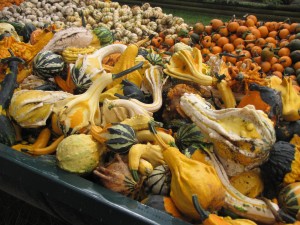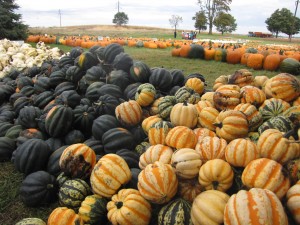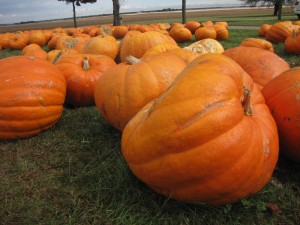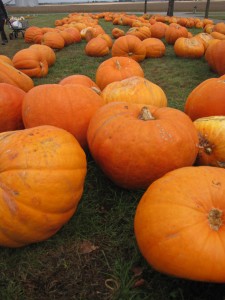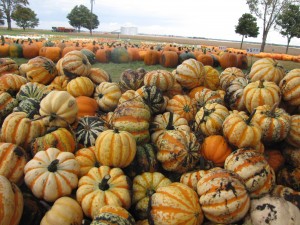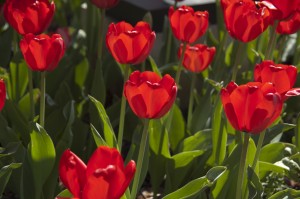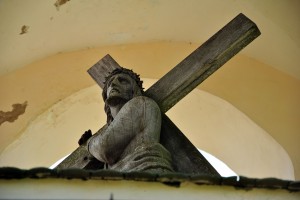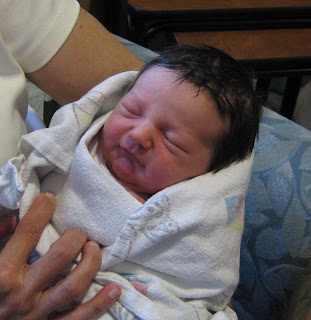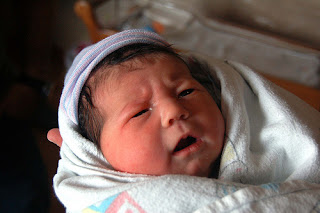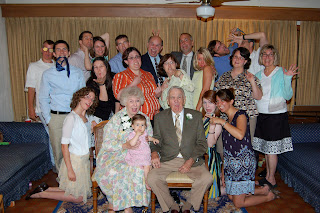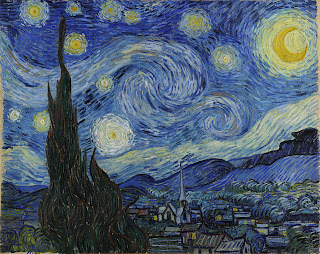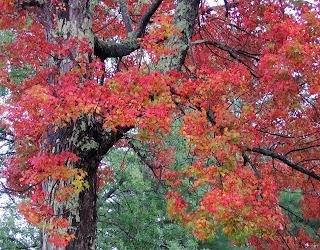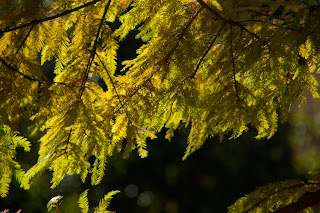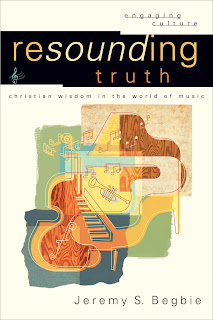Category Archives: praise
When Praise is a Sacrifice
Sacrifice is hard.
I suppose that is clear from the very definition of the word.
The idea of a sacrifice of praise seems a strange sort of concept. We tend to view praise as spontaneous, as rising from our rising and joyful emotions. How can such praise be a sacrifice?
That sort of praise is not such a sacrifice. But what about the praise that comes from a woman who has just lost her child? What about the praise from a man who does not know how he will feed his family? What about the praise from Christ-follower who lives every day in fear of torture or death because of Who he follows?
Through Him then let us continually offer up a sacrifice of praise to God, that is, the fruit of lips that acknowledge His name. (Heb. 13.5)
The praise of the one ravaged by cancer, the praise of the one dying inside from loneliness, the praise of the one who isn’t even sure that God is really there…these are a sacrifice. These are that sacrifice of praise.
But how? How is it even possible to praise God while living through such circumstances?
Through Him
Through who?
Look back just one chapter.
…looking to Jesus…who for the joy set before him endured the cross, despising the shame, and is seated at the right hand of the throne of God. Consider him who endured from sinners such hostility against himself, so that you may not grow weary or fainthearted. (Heb. 12. 2-3)
How? By looking to Jesus. By looking to the One who was able to offer up His own sacrifice of praise while enduring the physical pain of the cross, while enduring the emotional shame of the cross, while enduring the heartbreaking separation from His own Father.
By keeping our eyes fixed on Jesus, and therefore off of ourselves, we are given courage and strength to do what we think is impossible. We are kept from growing weary and fainthearted.
By fixing our eyes on Jesus, the author and perfecter of our faith, we are able to continually offer up a sacrifice of praise. An offering of praise that endures all time and all circumstance. An offering of praise that is beautiful to God.
Art credits: Sunlight through tulips photograph by Kirk Sewell Photography; photograph of Jesus carrying the cross sculpture by Asta Rastauskiene
For the Beauty
I have written a lot about the ugly things of life, about death and about obeying when you can’t make sense of what you see.
I have been reminded recently of how beautiful this life can also be.
Will you feast with me? Replenish your soul with beauty.
Let God remind you of His goodness, then walk away more able to see the beauty all around you.
(perhaps let this play while you soak in the rest of this beauty? And if you are viewing this via email/in a reader, click here to view this video)
A Psalm of Love
What You Should Do Next
What should we do now?
How should we respond?
When life seems to be running rapidly into a dead end
When we feel carved out and emptied by the rivers of this world’s realities
When the weight of our pain threatens to crush
When our hearts are pitted and scarred by pain, anguish, shame
What should we do?
Yes, we continue to obey, to follow the signs.
To what purpose? To what end?
The men who walked in the fire told a king that even if God refused to rescue, they would continue to obey.
The man who lost all but his life declared that even if God took the last thing remaining to him, he would continue to trust.
Why do we obey, why do we trust even when we cannot seem to find the light?
Listen.
Listen to the Word speak.
Listen to what the Word says as He is drawing very near to His own darkness.
“Now my heart is troubled, and what shall I say? ‘Father, save me from this hour’? No, it was for this very reason I came to this hour. Father, glorify your name!”
The Glory of God our Father.
Out of the rocks, His glory bursts forth.
Out of the dead and the dying, His beauty shines out.
All praise to God the Father, God the Son, and God the Holy Spirit.
Father, glorify Your name!
To Voice Creation’s Praise
I am a musician.
I have never considered how music as an art points to God.
The materials we use to produce sounds (both instruments and vocal chords), the sound waves themselves, our bodies (both in producing sounds and in being able to hear sounds), and even time are all things that already exist, created by God, with which we are allowed to join.
If, by making music, we are tuning in to something that has already been created, perhaps music is able to “elicit something of the character of the cosmos and through that testify to the Creator”. As well as declaring the glory of God, perhaps music (all of the arts, really!) “through the Spirit, (is) capable of granting glimpses of eternal beauty and as such can anticipate and give a foretaste of the transfiguration of the cosmos”, that moment when all of creation will be made perfect.
We should be awe-filled and grateful for the very possibility of music.
It will mean regularly allowing a piece of music to stop us in our tracks and make us grateful that there is a world where music can occur, that there is a reality we call “matter” that oscillates and resonates, that there is sound, that there is rhythm built into the fabric of the world, that there is the miracle of the human body…
None of this had to exist, but it does, for the glory of God and for our flourishing.
As I think about this theology of music, it draws me to the essential habit of gratitude.
Giving thanks is the way into joy. ~ Ann Voskamp in One Thousand Gifts
Paul says in Philippians 4 to not be anxious but rather to give everything to God with thanksgiving and in return, God will give you the gift of peace.
It seems almost ludicrous now, but before reading this book I had never thought through what music can teach us about God. How could I have gone so long without thinking through the implications of this art that I practice? Perhaps this is something that the rest of you have put together long before now, but I am a little slow at times.
I have already, in a previous essay, discussed what music teaches us about the goodness of time, the goodness of delay. Music also teaches us that tension is not bad, that by not trying to skip over days with
dark shadows and turns, we allow ourselves to be led far more profoundly into the story’s sense and power. Music is remarkably instructive here, because more than any other art form, it teaches us how not to rush over tension, how to find joy and fulfillment through a temporal movement that includes struggles, clashes and fractures.
Music gives us a beautiful picture of the Trinity: If I play a chord, three notes on the piano, each note fills up all of my heard space, the entirety of my aural space, yet I hear the notes as distinct from each other.
The notes interpenetrate, occupy the same heard space, but I can hear them as (three) notes…What could be more apt than to speak of the Trinity as a three-note chord, a resonance of life; Father, Son, and Spirit mutually indwelling, without mutual exclusion, and yet without merger, each occupying the same space, ‘sounding through’ one another, yet irreducibly distinct, reciprocally enhancing, and establishing one another as one another?
Music also gives us a beautiful picture of our freedom in Christ: If I play one note on the piano while silently depressing the key an octave above in order to open up the string, the upper string will vibrate even though it has not been struck. The lower string sets off the upper, and the more the lower string sounds, the more the upper string sounds in its distinctiveness. Do you see where this is going?
The more God is involved in our lives, the freer we shall be, liberated to be the distinctive persons we were created to be. And such is the freedom we can share, by virtue of God’s gift of freedom, with others. Simultaneously sounding notes, and the music arising from them, can witness to a form of togetherness in which there is an overlap of spaces out of which come mutual enrichment and enhancement, and a form of togetherness that can be sensed first and foremost as a gift, not as a consequence of individual choices.
Oh, there is so much more I wish I could discuss with you: How music teaches us about how the love of God can be our cantus firmus around which the other melodies of life provide their counterpoint. How it teaches us to read Scripture on many different levels and view our lives as part of a “multileveled hope that covers a huge range of timescales”. How music shows us that delay teaches us something new “of incalculable value that cannot be learned in any other way”.
Ah, but I will restrain. This is becoming too long already.
May I close with a challenge for us as the Church? A challenge for musicians and non-musicians alike?
We seem to have an intense musical conservatism in contemporary worship music.
Granting that simple songs have their place,…one would have hoped that a movement that can put such weight on the Holy Spirit’s renewal could generate somewhat more adventurous material…Is the church prepared to give its musicians room to experiment (and fail), to juxtapose different styles…to resist the tendency to rely on formulas that ‘work’ with minimum effort…in order that congregational worship can become…more true to the God who has given us such abundant potential for developing fresh musical sounds?
Could we, as a church, consider music (as well as all of the arts) as something that can glorify God without having an evangelical message tagged on to it, simply by having artistic excellence?
I would love to hear from artists who practice in other arenas. What theology do you find in your particular art form? What about non-artists? Do you see God in any particular form of art?
I’ll end with one last quote and a poem:
We who have misdirected our praise have been invited, against every expectation and everything we deserve, to step back into that role intended for us, to voice creation’s praise to the resounding glory of the Creator, and to witness wonders beyond imagining in our own lives and the lives of others.
Since I am coming to that holy room,
Where, with thy choir of saints for evermore,
I shall be made thy music; as I come
I tune the instrument here at the door,
And what I must do then, think here before.
~ Hymn to God My God, in My Sickness by John Donne
~ If you are receiving this in your email, may I suggest that you go to the website to better view the videos and hear the music?
~ all quotes, unless otherwise specified, are from Resounding Truth
~ photo credits: Street Musician; Dublin Philharmonic Orchestra
Kristina
Beauty in both heart and face
God’s gift for twenty-six years
More than we deserved
Hard to see through tears
Scraps of colored paper were her gift
Our hearts now are torn, our emotions set adrift
Made divinity, read books, gave flicks, played games
This beautiful marriage was more of God’s grace
Her husband’s world, on the outside, is going up in flames
Yet
God is always good and God is always love
Beauty and joy in even this is given from above
I don’t begin to understand but I declare what I don’t yet see
God promises to transform weeping into dancing, pain into glory
She’s home, she’s well, her life and body as they were always meant to be
An Old Question, Part Two
May we continue our conversation from last week?
Then God said, “Let us make man in our image, in our likeness…”
~ Genesis 1.26
The first part of that amazing declaration is “Let us make”
We are created by God. We are part of God’s creation.
Along with the trees, mountains, birds and sun, we ARE God’s creation.
We humans, however, have a unique role that was given to us. A role that only we can fulfill.
We are (as far as we know!) the only creatures who can love God in return.
We are the only part of creation who can give voice to the wordless praise of all creation.
As Jeremy Begbie says in Resounding Truth,
In the human being, creation finds a conscious answering voice, a mortal from the dust of the earth who can know and respond to God’s love as a creature, love God in return, and as a part of this response, voice creation’s praise.
This is a beautiful picture and a beautiful role.
What grace that God entrusted this to us!
What tragedy that our role as worshiper in creation has twisted into worshiper of creation.
Including worshiper of self.
Oh.
Just as I have twisted my role as God’s representative, I have twisted my role of offering worship on behalf of all creation.
…disproportioned sin
Jarred against nature’s chime, and with harsh din
Broke the fair music that all creatures made
To their great Lord, whose love their motion swayed
In perfect diapason, whilst they stood
In first obedience, and their state of good.
~ John Milton “At a Solomn Music”
However.
What a beautiful word, “however”.
God gave us grace through Christ.
Jesus. Man. God.
A man who gave complete and un-distracted praise to God.
A man who acted out God’s wise rule in the world.
He is our worship to God ~ perfect praise from us to God, creation’s perfect voice.
He is the image of God to us ~ perfect representation of God, being a wise steward of the earth, He brought healing, restoration, hope and peace from God to earth.
Jesus helped and healed many people, like this. He made blind people see. He made deaf people hear. He made lame people walk. Jesus was making the sad things come untrue. He was mending God’s broken world. ~ Jesus Storybook Bible
The most exciting part of this gift, this grace? We are invited to join Him!
As Begbie says,
Our privilege is to find our true place in the world, to be conformed by the Spirit to Christ (II Corinthians 3.18) so we can start to be true image bearers ourselves, reflecting the covenant love of God to the world…In Christ through the Spirit we can recover our calling as God’s image bearers, as the people of God exercising wise stewardship. This is part of authentic “spiritual worship” (Romans 12.1).

